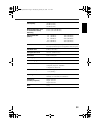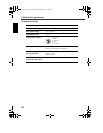
38
Session-at-Once (SAO)
This method is used to write data on a disc on a session-by-session basis. Unlike
Track-at-Once described above, Session-at-Once enables you to record multiple
tracks onto a disc at a time. CD EXTRA, for example, uses this method to write
multiple pieces of audio data (or multiple tracks) in the first session and information
required for computers in the second session. This method enables you to add data
into the same disc, one session at a time, as long as there is free space available on
the disc. A disc that contains data written in several sessions by this method is
defined as a multi-session disc, like a disc written by the Track-at-Once method.
Packet Writing
This method is used to record data onto a disc on a file-by-file basis. This method
divides a track into small segments called “packets” so that data can be written on a
packet-by-packet basis, which means that you can write data in much the same way
as you copy data to a floppy or hard drive. Since the data can be written easily,
packet writing is proper to daily data backup. Packet writing also enables you to add
packets to a disc as long as there is free space available on the disc.
• Discs need to be formatted for packet writing prior to use.
• Formatting a CD-RW disc using packet writing software reduces its storage capacity
by about 100 MB since packet writing requires exclusive space for itself.
• For CD-R discs, deleting data means masking data but not actually removing data.
Therefore, actual free space in a CD-R never be increased even if data is deleted.
Audio Master Quality Recording (High quality audio writing mode)
This method enables you to record high quality data that can be played back with the
1.4 m/s linear velocity.
• Audio Master Quality Recording (High quality audio writing mode) is enabled with
the 4X speed Disc-at-Once writing method.
• Maximum recording time is 63 minutes for a 650 MB CD-R disc and 68 minutes for a
700 MB CD-R disc.
Note
Note


















